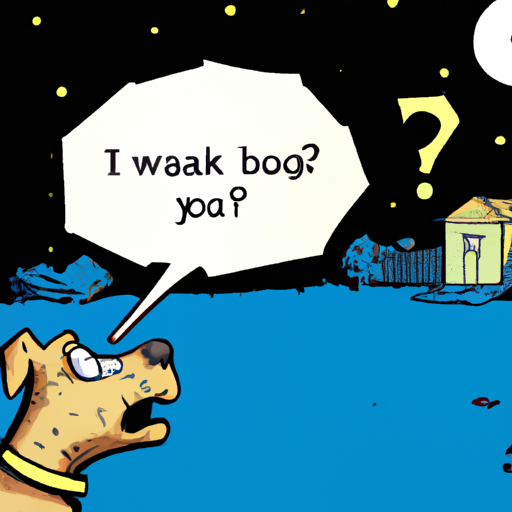As a caregiver to your furry friend, it can be both puzzling and troubling when your dog barks at seemingly nothing in the dead of the night. Why do they do this, and what can you do about it?
Understanding the Canine Senses
Firstly, it’s important to remember that dogs have far superior senses to us. Their hearing range is almost twice as ours, and their sense of smell is up to 100,000 times better. So, when your dog barks at ‘nothing’, they might be reacting to a sound or scent that you simply can’t detect.
- Sound Sensitivity: Dogs can hear frequencies between 40 Hz to 60,000 Hz, while humans can only hear between 20 Hz to 20,000 Hz. This means your dog could be hearing a mouse squeak, an owl hoot, or a car engine start a mile away.
- Scent Sensitivity: Dogs have around 300 million olfactory receptors in their noses, compared to about 6 million in us. They also have a part of their brain devoted to interpreting smells that’s 40 times larger than ours. They could be picking up the scent of an animal or person that has been in the area recently.
Possible Health Issues
Secondly, excessive barking, especially at night, might be a sign of health issues. Dogs often communicate discomfort or pain through changes in their behavior.
- Vision loss: Dogs with vision loss may feel more insecure at night and bark at any perceived threat.
- Cognitive Dysfunction Syndrome (CDS): Older dogs may develop CDS, similar to Alzheimer’s in humans, leading to confusion and increased vocalization.
- Pain or discomfort: Any physical discomfort can cause your dog to bark. It’s always a good idea to consult a vet if your dog’s barking behavior changes suddenly.
The Role of Breed and Individual Personality
Thirdly, some dogs are naturally more vocal or more prone to anxiety than others. Breeds like terriers and hounds have been bred over generations to alert humans to potential threats, so they’re more likely to bark at night.
- Terrier Breeds: These dogs were bred to hunt and kill vermin, so they have a strong instinct to alert their owners to potential threats.
- Hound Breeds: Hounds were bred to chase game. Many hounds will ‘bay’ or bark at night if they hear or smell something interesting.
Tips to Reduce Night-Time Barking
Here are some strategies you can use to reduce your dog’s night-time barking:
- Provide mental and physical stimulation during the day to help them sleep better at night.
- Keep a consistent bedtime routine.
- Use noise-cancelling dog earmuffs or white noise machines to reduce the sounds they can hear.
- Consult a professional dog trainer or behaviorist if the barking continues.
FAQ
Q: Is night-time barking normal for puppies?
A: Yes, puppies often bark at night due to separation anxiety. Training and consistency can help reduce this behavior.
Q: Does neutering or spaying affect a dog’s barking behavior?
A: It might. Some dogs become less territorial and less likely to bark after being neutered or spayed.
Q: Should I ignore my dog when it barks at night?
A: It depends on the reason. If it’s due to attention-seeking, ignoring can be effective. But if it’s due to anxiety or a health issue, it’s important to address the underlying problem.
Learning why your dog barks at night can help you better understand and cater to their needs. It can strengthen your bond and ensure a peaceful night’s sleep for both of you.



